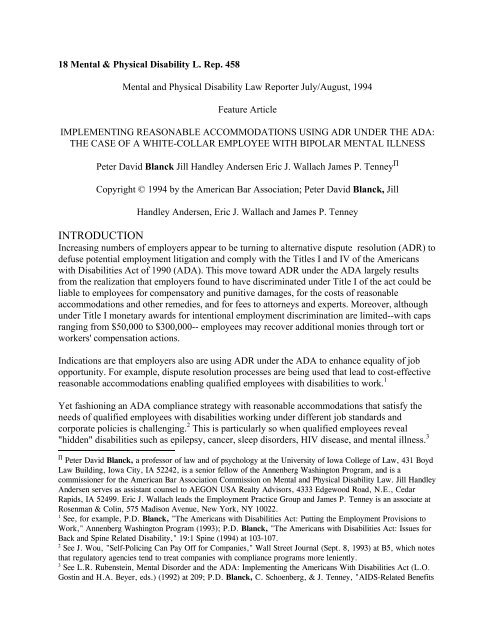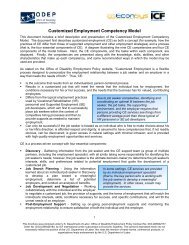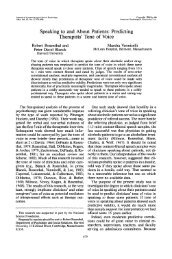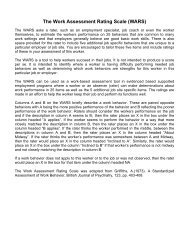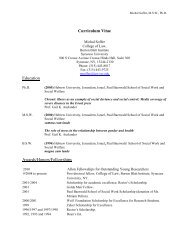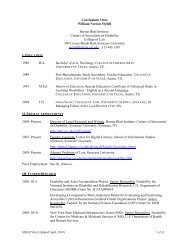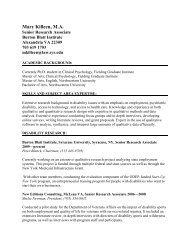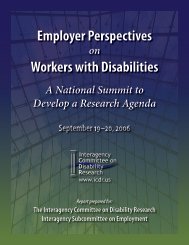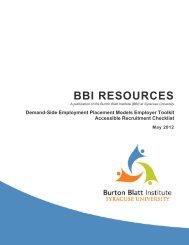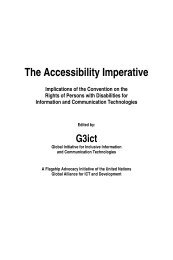Implementing reasonable accommodations using ADR under the ADA
Implementing reasonable accommodations using ADR under the ADA
Implementing reasonable accommodations using ADR under the ADA
You also want an ePaper? Increase the reach of your titles
YUMPU automatically turns print PDFs into web optimized ePapers that Google loves.
18 Mental & Physical Disability L. Rep. 458Mental and Physical Disability Law Reporter July/August, 1994Feature ArticleIMPLEMENTING REASONABLE ACCOMMODATIONS USING <strong>ADR</strong> UNDER THE <strong>ADA</strong>:THE CASE OF A WHITE-COLLAR EMPLOYEE WITH BIPOLAR MENTAL ILLNESSPeter David Blanck Jill Handley Andersen Eric J. Wallach James P. Tenney ∏Copyright © 1994 by <strong>the</strong> American Bar Association; Peter David Blanck, JillHandley Andersen, Eric J. Wallach and James P. TenneyINTRODUCTIONIncreasing numbers of employers appear to be turning to alternative dispute resolution (<strong>ADR</strong>) todefuse potential employment litigation and comply with <strong>the</strong> Titles I and IV of <strong>the</strong> Americanswith Disabilities Act of 1990 (<strong>ADA</strong>). This move toward <strong>ADR</strong> <strong>under</strong> <strong>the</strong> <strong>ADA</strong> largely resultsfrom <strong>the</strong> realization that employers found to have discriminated <strong>under</strong> Title I of <strong>the</strong> act could beliable to employees for compensatory and punitive damages, for <strong>the</strong> costs of <strong>reasonable</strong><strong>accommodations</strong> and o<strong>the</strong>r remedies, and for fees to attorneys and experts. Moreover, although<strong>under</strong> Title I monetary awards for intentional employment discrimination are limited--with capsranging from $50,000 to $300,000-- employees may recover additional monies through tort orworkers' compensation actions.Indications are that employers also are <strong>using</strong> <strong>ADR</strong> <strong>under</strong> <strong>the</strong> <strong>ADA</strong> to enhance equality of jobopportunity. For example, dispute resolution processes are being used that lead to cost-effective<strong>reasonable</strong> <strong>accommodations</strong> enabling qualified employees with disabilities to work. 1Yet fashioning an <strong>ADA</strong> compliance strategy with <strong>reasonable</strong> <strong>accommodations</strong> that satisfy <strong>the</strong>needs of qualified employees with disabilities working <strong>under</strong> different job standards andcorporate policies is challenging. 2 This is particularly so when qualified employees reveal"hidden" disabilities such as epilepsy, cancer, sleep disorders, HIV disease, and mental illness. 3∏ Peter David Blanck, a professor of law and of psychology at <strong>the</strong> University of Iowa College of Law, 431 BoydLaw Building, Iowa City, IA 52242, is a senior fellow of <strong>the</strong> Annenberg Washington Program, and is acommissioner for <strong>the</strong> American Bar Association Commission on Mental and Physical Disability Law. Jill HandleyAndersen serves as assistant counsel to AEGON USA Realty Advisors, 4333 Edgewood Road, N.E., CedarRapids, IA 52499. Eric J. Wallach leads <strong>the</strong> Employment Practice Group and James P. Tenney is an associate atRosenman & Colin, 575 Madison Avenue, New York, NY 10022.1 See, for example, P.D. Blanck, "The Americans with Disabilities Act: Putting <strong>the</strong> Employment Provisions toWork," Annenberg Washington Program (1993); P.D. Blanck, "The Americans with Disabilities Act: Issues forBack and Spine Related Disability," 19:1 Spine (1994) at 103-107.2 See J. Wou, "Self-Policing Can Pay Off for Companies," Wall Street Journal (Sept. 8, 1993) at B5, which notesthat regulatory agencies tend to treat companies with compliance programs more leniently.3 See L.R. Rubenstein, Mental Disorder and <strong>the</strong> <strong>ADA</strong>: <strong>Implementing</strong> <strong>the</strong> Americans With Disabilities Act (L.O.Gostin and H.A. Beyer, eds.) (1992) at 209; P.D. Blanck, C. Schoenberg, & J. Tenney, "AIDS-Related Benefits
To illustrate <strong>the</strong> potential benefits of <strong>using</strong> <strong>ADR</strong> <strong>under</strong> <strong>the</strong> <strong>ADA</strong> in providing <strong>reasonable</strong><strong>accommodations</strong>, this article presents <strong>the</strong> case of a white-collar employee with bipolar mentalillness. 4 The discussion identifies eight key "decision points" in <strong>the</strong> accommodation process thatare relevant to employers, persons with disabilities, human resource personnel, and in-house andexternal employment counsel.Although this case reflects <strong>the</strong> experiences of an actual employee, <strong>the</strong> facts have been changed toprotect <strong>the</strong> participants' privacy and to address evolving concepts related to <strong>ADA</strong> compliance.Readers also should note that employers, employees, and attorneys often face work placesituations in which <strong>the</strong> facts, <strong>the</strong> case law, or Equal Employment Opportunity Commission(EEOC) rules and guidelines are not completely clear. The discussion highlights many issues ofconcern, often when definitive conclusions cannot be made.THE CASE OF MIKE JOHNSONMike Johnson was a thirty-five-year-old senior account executive for Perfect Technologies, Inc.,a large nationwide manufacturer and distributor of sophisticated communication systems. By1993, Mike had held this position for five years and was considered an excellent employee. Heconsistently exceeded his sales goals and earned more than $80,000 annually in salary andcommissions, largely by developing accounts with national clients.After a recent sales campaign, Mike checked himself into a mental health facility, where he wasdiagnosed as having bipolar mental illness (sometimes called manic-depression). Mikeimmediately reported his illness to his supervisor and applied for short-term disability benefits.After a three- week period of hospitalization and rest, Mike told his supervisor that he was"ready to return to work" and that he should "stay this way as long as he continued outpatienttreatment." Mike returned to work, and after one month on <strong>the</strong> job appeared to be performingsatisfactorily.Mike's supervisor <strong>the</strong>n noticed that most evenings Mike worked extremely late and thatoccasionally Mike did not arrive at work until lunch time. After being back on <strong>the</strong> job for twomonths, Mike told his supervisor, "I feel stressed out again and wish <strong>the</strong>re were an alternative."In nei<strong>the</strong>r this nor subsequent discussions with his supervisor did Mike refer to himself as aperson with a disability or request any specific <strong>accommodations</strong>. Indeed, Mike exceeded hissales quota for his first two months after returning to work. Out of a genuine concern for Mike'shealth and well- being, however--and in recognition of <strong>the</strong> business's need to retain Mike'snational accounts--Mike's supervisor discussed Mike's situation with Perfect's management.Perfect's managers decided to consult <strong>the</strong> firm's human resources staff and employment lawEquation: Soaring Costs Times Soaring Needs Divided by Federal Law," 9:4 AIDS Policy and Law (1994) at1-7. U.S. Department of Justice and Equal Employment Opportunity Commission, Americans with DisabilitiesAct Technical Assistance guidelines (BNA) (1992) at 90, 0233, 0235-0236.4 See "Should <strong>the</strong> CEO Allow Dan to Return to Work?" Harvard Business Review (May 1994) at 24 for ano<strong>the</strong>rcase study of an employee with bipolar disorder and advice on how his employer should have handled hisdisability.
counsel to chart an appropriate course of action. Out of those discussions emerged eight decisionpoints.Point 1. Ignore or Address Mike's DisabilityWhen Mike used his disability leave, and when his supervisor suspected Mike had a disability,what should Perfect have done? 5 Perfect recognized it had an obligation to provide Mike with<strong>reasonable</strong> <strong>accommodations</strong> if he identified himself as a qualified person who needed <strong>the</strong>m. Butwas Perfect required to accommodate Mike's disability only if Mike formally announced that hehad a disability and requested specific <strong>accommodations</strong>? When Mike spoke about feeling"stressed out" and wishing he had an "alternative," should Perfect have initiated fur<strong>the</strong>r dialoguewith Mike about his condition?The EEOC regulations and at least one court opinion indicate that employers have no duty toaccommodate a hidden disability if an employee denies it exists. 6 Yet whe<strong>the</strong>r Perfect had toconsider making <strong>accommodations</strong> for Mike without his declaring that he needed any is notabsolutely clear. Given <strong>the</strong> firm's knowledge of Mike's recent hospitalization, were Mike'scomments to his supervisor sufficient to trigger Perfect's obligation to at least assess a need for<strong>accommodations</strong> <strong>under</strong> <strong>the</strong> <strong>ADA</strong>? If so, when should Perfect have known that <strong>the</strong> <strong>ADA</strong> had beenimplicated? Several Perfect executives believed that <strong>the</strong>se sounded too much like "questions fora jury," so <strong>the</strong> firm's management decided to find out more about Mike's situation. Managementalso believed that by initiating a dialogue with Mike, <strong>the</strong> firm might avoid any losses in Mike'ssubstantial productivity attributable to an unaccommodated disability. 7If Mike's supervisor had not discussed <strong>the</strong> matter with Perfect's management, <strong>ADA</strong>-relatedcomplications might have arisen later. For example, ano<strong>the</strong>r supervisor or executive might haveviewed Mike's absences as "unexcused" and sought to terminate him. 8 Similarly, o<strong>the</strong>rsupervisors might have resisted granting Mike any "special privileges," reasoning that he had toadjust to <strong>the</strong> daily stress at Perfect as his co-workers did. Some might have even had doubtsabout <strong>the</strong> initial decision to hire Mike, fearing reprisals from senior management for relying onsomeone "with a disability" who could cost <strong>the</strong> firm substantial losses in business revenue.After <strong>the</strong>se discussions with management, Mike's supervisor received <strong>the</strong> support of Perfect'shuman resource staff and legal counsel and was directed to talk with Mike to <strong>under</strong>stand howMike was doing and to ask if <strong>the</strong> company could do anything to help him. Fortunately, <strong>the</strong> good5 This issue is fur<strong>the</strong>r complicated by Perfect's duty to comply with <strong>the</strong> Family Medical Leave Act of 1993, whichgives employees <strong>the</strong> right to take up to twelve weeks of leave in a twelve-month period for "serious healthconditions," but a discussion of this law is beyond <strong>the</strong> scope of this article. See Table 1, Section IV (A)(7).6 See, for example, Braun v. American International Health & Rehabilitation Srvs., Inc., 846 P.2d 1151 (Or.Sup. Ct. 1993), 17 MPDLR 386, interpreting an Oregon civil rights statute ruling that an employer had no duty tofacilitate employee's recognition of her alcoholism.7 "[G]ood management alone may warrant accommodating an employee with a mental illness who does not fallstrictly within Title I's protection." D. Zuckerman, K. Debenham, & K. Moore, The <strong>ADA</strong> and People withMental Illness: A Resource Manual for Employers at 9 (1993).8 See E. Marcus, "Mental Disabilities <strong>under</strong> <strong>the</strong> <strong>ADA</strong>: Potential litigation Problems of Americans withDisabilities Act," Risk Management (Feb. 1994) at 49-51, which notes that unpredictable and irregular attendanceseems not to be tolerated <strong>under</strong> <strong>the</strong> <strong>ADA</strong> and not to constitute <strong>reasonable</strong> accommodation, although attendancestandards may have to be modified to accommodate certain types of disabilities.
elationship Mike had enjoyed with his supervisor over <strong>the</strong> past few years set <strong>the</strong> stage for asuccessful dialogue. During a closed-door meeting, Mike explained his condition to hissupervisor at length and in lay terms. Mike also provided his <strong>the</strong>rapist's name to <strong>the</strong> supervisorand consented in writing to have his medical records related to bipolar disorder released for <strong>the</strong>confidential use of Perfect's medical consultant.Mike explained that his psychiatrist was prescribing a combination of medications and varying<strong>the</strong> levels of medication. Although his mental illness had stabilized somewhat over <strong>the</strong> pastmonth, Mike and his psychiatrist continued to monitor and adjust <strong>the</strong> drug <strong>the</strong>rapy. According toMike's psychiatrist, Mike would be less likely to <strong>under</strong>go severe shifts between mania anddepression if he continued <strong>the</strong> drug <strong>the</strong>rapy. Mike would, however, continue to experience awider range of euphoria and depression than would persons without bipolar disorder. Mike wasattending group <strong>the</strong>rapy and individual counseling sessions twice each week to help him functionwith bipolar disorder.Point 2. Get <strong>the</strong> FactsMuch preparation and fact finding had to be completed before Perfect could begin a formaldialogue with Mike. The firm first had to determine whe<strong>the</strong>r Mike's condition qualified forprotection <strong>under</strong> <strong>the</strong> <strong>ADA</strong>.Mike was considered to have a disability covered by <strong>the</strong> <strong>ADA</strong> because he had a mentalimpairment that substantially limited <strong>the</strong> "major life activity" of work. 9 A review of a standardphysician's reference book substantiated Perfect's initial perception that Mike's condition was acovered mental impairment. "Mental impairment" is a broad term that includes mentalretardation, organic brain damage, learning disabilities, and mental illnesses. In addition, Mikewould have been protected by <strong>the</strong> <strong>ADA</strong> even if he had no apparent disability as long as Perfect"regarded" him as having a disability.Perfect next assessed <strong>the</strong> ways that Mike's disability substantially limited his work. With Mike'sconsent, Perfect sought outside medical guidance on <strong>the</strong> specific nature of Mike's condition. Thefactors addressed included its severity, expected duration, and long-term impact. The consultantconfirmed Mike's representation to his supervisor that his mental illness was "permanent." Thefirm also learned that when he was in a manic cycle of his bipolar illness, Mike's work wassubstantially limited by his tendency to create grandiose schemes and to overload his schedule.His working until late at night may have reflected <strong>the</strong> beginning of such a manic phase. Whendepression set in, Mike would likely wake up late for work, miss appointments and projectdeadlines, and experience fatigue.Although Mike came in late some days during his first two months back on <strong>the</strong> job, he was ableto adjust his appointment schedule. According to his psychiatrist, Mike had experiencedrelatively mild manic and depressive cycles after he returned to work. Moreover, he had recentlylanded a new national account. Nothing about Mike's behavior or his prognosis <strong>the</strong>refore9 See E. Marcus, "Mental Disabilities <strong>under</strong> <strong>the</strong> <strong>ADA</strong>: Potential litigation Problems of Americans withDisabilities Act," Risk Management (Feb. 1994) at 49-51, which notes that unpredictable and irregular attendanceseems not to be tolerated <strong>under</strong> <strong>the</strong> <strong>ADA</strong> and not to constitute <strong>reasonable</strong> accommodation, although attendancestandards may have to be modified to accommodate certain types of disabilities.
suggested to <strong>the</strong> company's physician that Mike posed a risk of substantial harm to himself oro<strong>the</strong>r employees.Although Perfect acknowledged Mike's disability, Mike was not entitled automatically toprotection <strong>under</strong> <strong>the</strong> <strong>ADA</strong>'s Title I unless he could show that he was a "qualified individual witha disability." Perfect believed that a judgment had to be made as to whe<strong>the</strong>r Mike could perform<strong>the</strong> essential functions of his job with or without <strong>reasonable</strong> accommodation. After reviewingMike's annual job evaluations prior to <strong>the</strong> onset of his illness, as well as his recentaccomplishments, Perfect concluded that Mike could perform in a highly satisfactory manner.Therefore, Perfect next had to determine whe<strong>the</strong>r it could make <strong>reasonable</strong> <strong>accommodations</strong> tohelp Mike perform his essential job tasks.Point 3. Identify Reasonable AccommodationsMike's supervisor was <strong>the</strong> initial source of information about potential <strong>reasonable</strong><strong>accommodations</strong>. The supervisor and Perfect's employment counsel met to discuss <strong>the</strong> <strong>ADA</strong>generally and <strong>the</strong> nature of Mike's disability specifically. A formal medical diagnosis by Mike's<strong>the</strong>rapist and by <strong>the</strong> physician consultant guided this discussion. Mike's supervisor also wasgiven a description of bipolar mental illness written in lay terms, in part to dispel common mythsassociated with <strong>the</strong> illness.Mike's supervisor learned that Mike experienced periods of mania and depression; thatsymptoms of mania included abundant energy, an unrealistic belief in one's abilities, increasedrisk taking, and irritability or distractibility; and that symptoms of depression includedpessimism, sleep problems, decreased energy, social withdrawal, and difficulty makingdecisions. Mike's supervisor also learned that treatment for bipolar disorder is generallyeffective and that persons with this condition function for long periods free of debilitatingsymptoms. After obtaining this information, Mike's supervisor worked with legal counsel andhuman resource staff to identify <strong>the</strong> essential functions of Mike's position by reviewing Mike'swritten job description.Identifying <strong>the</strong> type and scope of potential <strong>reasonable</strong> <strong>accommodations</strong> was <strong>the</strong> next task. AsPerfect assessed Mike's disability, several questions emerged: What symptoms of bipolardisorder affected Mike's ability to meet his sales projections--that is, to be "qualified" for hisjob? Did Mike's illness pose a threat to himself or to co-workers outside <strong>the</strong> office (e.g., whiledriving on long sales trips)? Would <strong>the</strong> costs of any <strong>reasonable</strong> <strong>accommodations</strong> pose an unduehardship to Perfect?Because Perfect had never before sought to formally accommodate an employee with a mentalillness, it decided to hire an <strong>ADA</strong> consultant to help determine appropriate <strong>accommodations</strong> forMike. Management believed that a neutral, external expert would be beneficial.Point 4. Assess <strong>the</strong> Need for ExpertisePerfect had to decide what type of consultant to retain and how best to do this. The telephonedirectory had no category entitled "<strong>ADA</strong> Consultant," although Perfect's in-house counsel knewof several <strong>ADA</strong> consultants who regularly made educational presentations. Should <strong>the</strong>consultant have training in medicine, workers' compensation law, occupational <strong>the</strong>rapy, or
employment law? Did <strong>the</strong> consultant need extensive knowledge about Perfect's business?Perfect's management suspected that no matter how much independence <strong>the</strong> consultant wouldhave according to <strong>the</strong> retainer agreement, if a situation arose that was not resolved <strong>using</strong> <strong>ADR</strong>and that led to litigation, a jury likely would view <strong>the</strong> consultant's recommendations as being"pro-employer." After all, Perfect, not Mike, would pay <strong>the</strong> consultant's fees. Fur<strong>the</strong>rmore, <strong>the</strong>consultant might be perceived as motivated to please Perfect in <strong>the</strong> hope of obtaining futurework or positive references from <strong>the</strong> firm. Management concluded that if <strong>the</strong> consultant couldfunction as a neutral problem solver by finding workable solutions and inspiring Mike's trust, <strong>the</strong>firm would improve its chances for a "win-win" situation: A productive employee would returnto work, litigation would be avoided, and <strong>the</strong> experience would provide a corporate model foraddressing employees' disabilities.Once <strong>the</strong> consultant was selected, a written contract was prepared that guaranteed <strong>the</strong>consultant's independence and neutrality. According to <strong>the</strong> contract's terms, <strong>the</strong> consultant'sobjective was to stimulate a problem-solving dialogue. In addition, <strong>the</strong> contract stated that <strong>the</strong>consultant could recommend <strong>accommodations</strong> that Perfect did not wish to use, and that pursuantto <strong>the</strong> <strong>ADA</strong>, Perfect could pick from a range of <strong>reasonable</strong> <strong>accommodations</strong>. Perfect was,however, required to have a business-related reason for rejecting any particular accommodation.Point 5. Assess Cost Factors and Potential Undue HardshipAfter analyzing Mike's job description, <strong>the</strong> <strong>ADA</strong> consultant developed a list of potential<strong>accommodations</strong> that Mike's supervisor, <strong>the</strong> firm's management, and counsel reviewed toevaluate each accommodation's cost, feasibility, and relevance to <strong>the</strong> <strong>ADA</strong>'s undue hardshipprovision. Mike's supervisor lacked authority to consent to several proposed <strong>accommodations</strong>,such as keeping Mike's salary constant during <strong>the</strong> transitional period (including hiscommissions) or temporarily reducing Mike's expected sales levels. These decisions had to bemade by management in light of Perfect's financial and staffing resources. Management'sdecision to accommodate Mike's disability was intended to reflect Perfect's commitment tocomply with <strong>the</strong> <strong>ADA</strong> in <strong>the</strong> context of sound business practice.Management, Mike's supervisor, and <strong>the</strong> <strong>ADA</strong> consultant reached a preliminary consensus on<strong>the</strong> choice of <strong>accommodations</strong>, subject to discussions with Mike. The cooperation and assent ofMike's supervisor in this process was crucial. If Mike's supervisor had not supported <strong>the</strong>consultant's proposals, a constructive discharge could have occurred--that is, Mike's supervisorcould have consciously or unconsciously made Mike's work environment hostile. This wouldnot have been conducive to productivity or to <strong>the</strong> <strong>ADR</strong> process and could have fur<strong>the</strong>raggravated Mike's disability.The group concluded that no new staff support position was needed to accommodate Mike'sdisability. The company was nei<strong>the</strong>r prepared nor required <strong>under</strong> <strong>the</strong> <strong>ADA</strong> to hire a full-timeassistant to "shadow" Mike as he performed his duties.The consultant did, however, suggest as an accommodation that Perfect accord Mike extendedpeer support in his job activities. Because Mike traveled for prolonged periods and could suffer arelapse while on <strong>the</strong> road by not eating regularly, having difficulty sleeping, and feeling
increased stress. The consultant recommended that during a six-week transitional period <strong>the</strong> firmshould send a co-worker--preferably of Mike's choice--to accompany Mike on extended nationalsales campaigns. The company supported this accommodation, as it provided assurance thatMike's interactions with customers continued to be positive and productive.Point 6. Initiate a Problem-Solving DialogueAfter management reviewed <strong>the</strong> consultant's prospective <strong>accommodations</strong> and selected those itwas willing to implement, a formal problem-solving dialogue with Mike was initiated. Ameeting was arranged at a time convenient for Mike. To reduce Mike's apprehension, <strong>the</strong> firminformed him in advance and in writing why <strong>the</strong> meeting was being held, who would attend <strong>the</strong>meeting, and <strong>the</strong> anticipated agenda. Mike was encouraged to bring a family member, friend, oradvisor to <strong>the</strong> meeting. Mike was also given a written list of <strong>the</strong> consultant's proposed<strong>accommodations</strong> in advance of <strong>the</strong> meeting so that he would have time to review <strong>the</strong>se and tothink of o<strong>the</strong>rs to suggest.At <strong>the</strong> consultant's suggestion, legal counsel and human resource staff did not attend <strong>the</strong> initialproblem-solving dialogue. Counsel's attendance could lead Mike to infer that <strong>the</strong> company hadsomething o<strong>the</strong>r than <strong>ADR</strong> on its agenda, such as documenting a legal record in favor of Perfect,which might in turn cause Mike to make only guarded comments. Management also recognizedthat Mike's supervisor needed to manage <strong>the</strong> program of accommodation on a daily basis. Thisrequired Mike's supervisor to be empowered to lead <strong>the</strong> dialogue. Because <strong>the</strong> supervisor wasnot experienced in <strong>ADR</strong> techniques, <strong>the</strong> consultant provided a basic briefing on mediation skills.Point 7. Develop an "Accommodation Plan"The accommodation meeting began with a discussion of <strong>the</strong> principles that governed <strong>the</strong>relationship between Perfect and Mike. Management recognized that Mike had a disability thataffected his job performance and assured him that Perfect was committed to offering him<strong>reasonable</strong> accommodation. Management assured Mike that his privacy would be respectedthroughout <strong>the</strong> accommodation process and reaffirmed Perfect's intent to comply with <strong>the</strong> <strong>ADA</strong>.The initial meeting focused on what was necessary to fulfill <strong>the</strong> essential demands of Mike'sposition. Mike and his supervisor reviewed each job task and came to an agreement about whichtasks were essential functions. The <strong>accommodations</strong> that <strong>the</strong> consultant had proposed prior to <strong>the</strong>meeting provided a springboard for discussion. Once Mike and his supervisor agreed to potential<strong>accommodations</strong>, <strong>the</strong>y established a time line for implementing <strong>the</strong>m. Finally, with <strong>the</strong>consultant's assistance, Mike and his supervisor developed a method for evaluating <strong>the</strong>effectiveness of <strong>the</strong> accommodation plan, which appears in Table 1 (see page 464).The consultant clarified that <strong>the</strong> accommodation plan was not a contract of employment, but was"more like a road map." The plan was put in writing and signed for several reasons. First, thismade <strong>the</strong> plan specific and thorough. Second, this made <strong>the</strong> plan tangible, so Mike and Perfectcould refer to it whenever questions arose. Finally, this substantiated <strong>the</strong> company's actions inproviding <strong>reasonable</strong> <strong>accommodations</strong>. The accommodation plan facilitated a positive workenvironment for Mike, his supervisor, and <strong>the</strong>ir colleagues so that <strong>the</strong>y could ensure thatcustomers were served in a timely, cost-effective manner.
Because Mike's job responsibilities were cyclical--consisting of periods of intense performanceand travel followed by periods of inaction--<strong>the</strong> accommodation plan included "short-term" and"long-term" <strong>accommodations</strong> and allowed for a gradual re-introduction of Mike's work load. Theplan reaffirmed Perfect's "open-door" policy and provided that Mike and his supervisor were tomeet weekly, at an established time, to discuss matters including sales calls, sales proposals,Mike's new initiatives, and o<strong>the</strong>r essential tasks Mike performed. The goal was to empower Mikeand his supervisor to make adjustments to <strong>the</strong> accommodation plan when necessary. The initialterm of <strong>the</strong> accommodation plan was six weeks, which permitted flexible responses and anevaluation.The plan's long-term <strong>accommodations</strong> were to continue as long as Mike remained employed atPerfect. One accommodation was flexible scheduling, which enabled Mike to obtain appropriatemedical care and attend group <strong>the</strong>rapy sessions. O<strong>the</strong>r long-term <strong>accommodations</strong> includedproviding Mike a private office to minimize interruptions during his periods of stress, andagreeing that Mike's supervisor's would not consider <strong>the</strong> six-week transitional period whenevaluating Mike's performance at his next annual review.Point 8. Evaluate <strong>the</strong> Accommodation PlanOn <strong>the</strong> closing date of <strong>the</strong> initial six-week accommodation plan, Mike, his supervisor, and <strong>the</strong><strong>ADA</strong> consultant met to evaluate its effectiveness. If all of <strong>the</strong> plan's goals had been met,discontinuing <strong>the</strong> short-term <strong>accommodations</strong> was an option. In Mike's case, however,discontinuing <strong>the</strong> short-term <strong>accommodations</strong> would have required him to resume all of hisprevious responsibilities. After some discussion, <strong>the</strong> <strong>ADA</strong> consultant suggested that <strong>the</strong>short-term <strong>accommodations</strong> not be eliminated too quickly. Therefore, a second six-weekaccommodation plan was implemented, <strong>under</strong> which Mike's productivity requirements increasedby increments and his responsibilities grew, but <strong>the</strong> prior short-term safeguards remained inplace.Based on <strong>the</strong> cyclical nature of Mike's illness and <strong>the</strong>tendency of persons with bipolar mentalillness to <strong>under</strong>go relapses, <strong>the</strong> <strong>ADA</strong> consultant suggested that requiring Mike to assume his fullresponsibilities at an early juncture could lead to a pattern of intense performance followed by noperformance. Therefore, after <strong>the</strong> twelve-week transition period ended, a third accommodationplan was developed jointly that eliminated <strong>the</strong> short-term <strong>accommodations</strong> and retained certainlong-term <strong>accommodations</strong>. The evaluation of <strong>the</strong> three accommodation plans included a writtenanalysis by Mike, his superior, and <strong>the</strong> <strong>ADA</strong> consultant.AnalysisJust a few years earlier, Perfect might "solved" Mike's case by terminating him immediatelyupon his return from hospitalization. If he had been unable to find subsequent employment,Mike's lost wages during <strong>the</strong> rest of his life easily could have exceeded two million dollars.Had Perfect terminated Mike without any attempt--or only a sham attempt--to accommodate hiscondition, Mike could have filed an <strong>ADA</strong> or state law claim, forcing Perfect to defend itself at a
cost of several hundred thousand dollars. 10 Mike's claims would have resulted in a "battle of <strong>the</strong>experts," with Mike alleging damages emanating from his termination and Perfect arguing thatMike's personality traits, sporadic attendance, and mental illness did not allow him to function<strong>under</strong> <strong>the</strong> ordinary work pressures of <strong>the</strong> job. Perfect also would have incurred training costs inreplacing Mike, which may exceed $100,000 for an account executive at Mike's level. Clientswho had developed strong relationships with Mike and were displeased by his termination mighthave resigned <strong>the</strong>ir accounts with Perfect.Perfect's decision to employ <strong>ADR</strong> techniques was relatively inexpensive. The actual costs ofPerfect's long-term <strong>accommodations</strong> were minimal: $30,000 for a multi-million dollar firm.Using its human resources staff to resolve problems promptly ra<strong>the</strong>r than after <strong>the</strong>y gave rise tolegal action proved far less time consuming and disruptive than <strong>the</strong> alternative of compelling itto assemble material for discovery and testimony at deposition and trial. 11The costs of engaging an <strong>ADA</strong> consultant and a medical consultant, temporarily reducing Mike'sproductivity, and keeping Mike's salary constant during <strong>the</strong> transitional period were substantiallyless than ei<strong>the</strong>r <strong>the</strong> cost of a legal defense or of fully training a replacement for Mike. Mostimportant, this strategy enabled Perfect to avoid <strong>the</strong> cost of losing a valued and qualifiedemployee, and supported Mike during his treatment and recovery.Perfect's <strong>ADA</strong> compliance strategy produced o<strong>the</strong>r long-term benefits. The <strong>ADA</strong> consultant wasnot needed for subsequent negotiations because Perfect's human resources staff was trained in<strong>using</strong> <strong>ADR</strong> <strong>under</strong> <strong>the</strong> <strong>ADA</strong>. Mike and his supervisor were able to act as mediators for o<strong>the</strong>rswith disabilities in <strong>the</strong> company. As a result of its experience with Mike, Perfect began toeducate its employees about <strong>the</strong> use of <strong>ADR</strong> <strong>under</strong> <strong>the</strong> <strong>ADA</strong> while taking proper measures toensure Mike's continued privacy. Training supervisors and managers in <strong>ADR</strong> techniques notonly supported compliance with <strong>the</strong> <strong>ADA</strong>, but improved general communication and managerialskills throughout Perfect. Perfect also began compiling an in- house data bank of potential<strong>accommodations</strong> and literature that could be useful for providing <strong>accommodations</strong> for o<strong>the</strong>rqualified employees with disabilities.CONCLUSIONThis article describes a process by which employers may use <strong>ADR</strong> principles to resolve potentialdisputes involving <strong>reasonable</strong> <strong>accommodations</strong> <strong>under</strong> <strong>the</strong> employment provisions of <strong>the</strong> <strong>ADA</strong>.Perfect's strategy was tailored to a white- collar employee with a bipolar mental illness in a largecorporation. The problem-solving process included ga<strong>the</strong>ring information about <strong>the</strong> employee'sdisability, <strong>the</strong> essential functions of <strong>the</strong> employee's position, and <strong>the</strong> needs of <strong>the</strong> company. Theprocess involved informal and formal dialogues with <strong>the</strong> employee, <strong>the</strong> employee's supervisor,management, and external consultants. The process resulted in a flexible accommodation planthat enabled Perfect to conduct systematic evaluations and appropriate revisions.10 The Center for Public Resources reports that for large cases, <strong>ADR</strong> saves an average of $800,000 per case. H.Mazadoorian, "Putting Toge<strong>the</strong>r an <strong>ADR</strong> Plan," Business Law Today (Sept./Oct. 1993) at 41.11 See B. McMahon, "Lessons from Litigation: The Employment Experience of Persons with Disabilities during<strong>the</strong> First Year of <strong>ADA</strong> Title I," NARPPS (in press), which notes that 38% of complaints filed <strong>under</strong> <strong>the</strong> <strong>ADA</strong> in1983 related to mental illness alleged unfair discharge or layoff, whereas only 13% alleged un<strong>reasonable</strong><strong>accommodations</strong>.
The process described above reflects <strong>the</strong> view that <strong>the</strong> <strong>ADA</strong> is as much a measure of this nation'sresolve to value individual rights as of <strong>the</strong> realization that millions of qualified persons withdisabilities are capable of contributing to <strong>the</strong> success of American business. This article is meantto stimulate discussion about opportunities and barriers in <strong>the</strong> actual implementation of Title I of<strong>the</strong> <strong>ADA</strong>. The analysis is not exhaustive, and readers should note that <strong>the</strong> positive outcome in <strong>the</strong>case of Mike Johnson resulted from good-faith efforts by all parties. Creative problem solverscan propose many o<strong>the</strong>r ways for employers and qualified employees with disabilities to promoteeffective <strong>ADA</strong> implementation as sound business policy.Table 1. The Accommodation Plan for Mike JohnsonI. PURPOSEPerfect Technology's employee Mike Johnson, his supervisor, and a consultant met to initiate aproblem-solving dialogue regarding Mike's disability. This accommodation plan describes anapproach that Mike and his supervisor have determined will meet <strong>the</strong>ir needs.II. PRINCIPLESA. Mike's privacy must be respected.B. Mike's medical condition, bipolar disorder, is a mental disability that may at times interferewith <strong>the</strong> performance of his duties at Perfect.C. Perfect is committed to offering <strong>reasonable</strong> <strong>accommodations</strong> to Mike.D. Mike and his supervisor want Mike to return to his status as a fully productive employee andto continue to improve his knowledge base and skills.E. Mike's supervisor needs to provide clients with excellent service in a timely fashion.F. Perfect must deliver its products in a fiscally responsible manner.III. TASKSTo return to <strong>the</strong> level of performance expected of a senior account executive, Mike must do <strong>the</strong>following.(At this point <strong>the</strong> plan reproduced Mike's job description).IV. ACCOMMODATIONSA. Short-Term AccommodationsThe following temporary <strong>accommodations</strong> will be accorded to Mike as support for an orderlyresumption of <strong>the</strong> performance of all <strong>the</strong> responsibilities of a senior account executive and arenot anticipated to be needed for more than six weeks.
1. A co-worker will be designated as a peer support person for Mike. Mike's peer support personwill accompany him on every trip that requires an overnight stay outside Mike's base city.2. On average, <strong>the</strong> number of sales calls Mike will make will equal one-half of those required byhis normal appointment schedule.3. Mike's rate of pay will remain at his average for this period in <strong>the</strong> previous calendar year,including bonus income.4. Mike's emergency calls and new customer calls will be minimized.5. Mike's supervisor will continue to learn <strong>the</strong> characteristics of bipolar disorder so that he has an<strong>under</strong>standing of Mike's disability, and will maintain an open-door policy for discussion.6. Perfect will engage a neutral advisor to assist in <strong>the</strong> dialogue on evaluating and modifying <strong>the</strong>plan of accommodation, and will make <strong>the</strong> advisor available to Mike and his supervisor inMike's base city.7. Although Perfect's company policies would permit it to apply Mike's paid vacation to hisperiod of hospitalization, Perfect has chosen not to do this. Instead, Mike may retain his pool ofvacation days so that he can draw upon <strong>the</strong>m to reduce stress.B. Long-TermAccommodations1. Mike's supervisor will permit <strong>the</strong> flexible scheduling of hours to accommodate Mike's need toattend doctor appointments, <strong>the</strong>rapy sessions, or o<strong>the</strong>r treatment.2. Mike will have access to a private work office space so that he can regulate his environmentand minimize interruptions during periods of stress.3. During Mike's annual performance review, Mike's supervisor will not use any informationga<strong>the</strong>red during Mike's period of hospitalization or <strong>the</strong> period of short-term accommodation orany information concerning bipolar mental illness in considering whe<strong>the</strong>r Mike qualifies for apromotion or raise.V. ASSESSMENTA. Mike and his supervisor will meet at least weekly, and more often if necessary, to discusswhe<strong>the</strong>r Mike is performing <strong>the</strong> tasks as expected.B. Mike and his supervisor agree that Mike must return to <strong>the</strong> level of productivity consistentwith a senior account executive. That level of productivity should be reached in six weeks.C. At <strong>the</strong> end of six weeks, Mike and his supervisor will meet to discuss <strong>the</strong> removal of <strong>the</strong>short-term <strong>accommodations</strong>.VI. REAFFIRMATION
This is not a contract. It is a voluntary statement by Mike and his supervisor meant to facilitate apositive work environment for Mike, his supervisor, and <strong>the</strong>ir colleagues to assure that Perfect'sclients are served in a timely, cost-effective manner.


